 One thing I love about looking at this age range is watching people experiment. Some of us have already had great success in finding an iconic voice that fits what we have to say right now, which is fantastic, but it's immensely exciting to me to see other writers taking wild, bold risks with their work to test the limits of what their art can sustain. The poems Rico Frederick sent me for consideration cover a lot of stylistic territory, from erasure to persona to dialogue: I can only conclude that he's a bit of a mad scientist. The piece below is a great example of this. Frederick experiments with pacing, tension, structure, texture, and voice, adding a pinch here, a dash there, willing to risk it all in the hopes of having that eureka! moment. I love and respect that quality in an artist, and I can't wait to see where these explorations go. * Four Hours At The Hospital Aug. 18th 2010 Hour 1: It’s cold. These emergency rooms –frozen to remind our organs / There is a morgue beneath every waiting room. Hour 2: The heart monitor tells unsaid secrets. If the green line goes flat, “What kind of dress do I pick out for my mother at her going-away party?” On days like this, my head signals the panic attack but my legs are paralyzed. Hour 3: The funeral home wakes its grey-haired head from off my shoulder. The unforgiving truth is – fragile is… & we, are. While the blood is being drawn, Tears prove six decades of armor can rust. Hour 4: She says: Dis bed doe care if I wake up in de morning, but if you think God put me on dis green earth to dead in hospital ya mus-see crazy or sumthing. Dey not going to bury my Black Ass up in dis sick people place, ya hear meh. Heard the news ran up a flagpole. Got all the way to Trinidad. All the family called, one by one. My Dad didn’t. * Rico is a Trinidadian transplant & the first poet ever to represent all FOUR New York City poetry venues at the National Poetry Slam. He is the author of an upcoming book of poetry & slammaster of the louderARTS Project. A distinguished graphic designer/novelist and full-time art director, Rico is also a lover of gummy bears who now calls Harlem home.
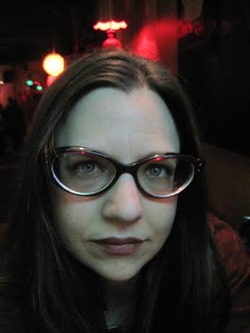 Bashō has been on my mind quite a bit recently. This is partly because I'm about to do some traveling over the next two weeks, and Narrow Road to the Interior is one of my favorite travelogues, but also because I've been remembering how much I admire how spare haiku can be, saying so much by saying so little. The poems I most enjoy by Nicky Beer are on the other end of my pleasure spectrum, however. There's a time and place for the spare and bare, then there's a time to make one's art fulgent, to dig both thumbs into the fruit of language and the sensate and let all that juice catch light. Beer is clearly a lover of the English tongue, and she wields it to display every “ornament and affliction” the world has to offer. Her poems can take some unraveling, but in the best way: they ask the reader to sit rapt and take notice. I'm so glad to learn about this poet, and I hope you are as well. The poem below was previously published in TriQuarterly. * FROST ON THE OCTOPUS The blue-ringed octopus is one of the most poisonous animals in the world. She is as at the fair both circus tent and sideshow freak within, each blue-ringed spot an ornament and affliction intent on advertising, in the polyglot speech of nature, her peculiar venom which seizes the victim first in a rush of wonderment, freezing his limbs in some sudden winter, all the while a weird thrush mottles his tongue with rime, so that his first words of love should be perfectly preserved for this tattooed girl, this contortionist adrift in the lonely excess of her power, so rife with death throughout she will at times, upon her own breath, taste its chill. * Nicky Beer is the author of The Diminishing House (Carnegie Mellon, 2010), winner of the 2010 Colorado Book Award for Poetry, and The Octopus Game (forthcoming 2015). Her awards include a fellowship from the National Endowment for the Arts, a scholarship and a fellowship from the Bread Loaf Writers' Conference, a Campbell Corner Prize, and a Discovery/The Nation Award. She is an assistant professor at the University of Colorado Denver. 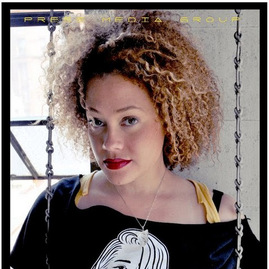 A mentor of mine once perfectly summed up why the phenomenon of hipsterdom so troubled him: neverending irony. As poets, sincerity is one of the best things we have going for us. A kind of world-weary [self-]critical voice can be quite powerful, but I think making a habit of it can make one's work less relevant. Suzi Q. Smith would likely agree. She's among the most earnest poets I know in our age range – and being earnest can be a serious challenge once you pass the 30 mark. I respect Smith's doggedness in this regard: she goes after emotional truth, to its core, no matter how troubling the implications may be. That kind of strength and resiliency are essential to becoming a great writer, and one who stays with the craft even when the work gets ugly and hard. Smith is one to watch, and I think the poem below shows why. * My Father's Hands The sun was 3:30 low and hot and so and so had said such and such about our mama or our daddy and we couldn’t say for sure whether or not it was true but we rolled four deep and were not going easy so when the mob of children met us at the corner we were ready, all of us with our father’s hands balled into stone and swing, our grandmother’s holler talking slick and mean from each mouth, our mother’s laugh, canyons away from us. We were born to fight. We did not learn. We have always known. Even when everyone was bigger and more, the hands knew how to fist, the holler knew when to howl, the laughter knew when to grimace into menacing forgiveness. This is true. This is science. This is the holiest magic. One long night so late it would have been morning, the sun swallowed its own face. In fact, all of the light had gone from the world. These father hands were dead fish, this grandmother holler a choke, this mother laugh a hunting hyena. Some hands some holler bigger than my holler, some laugh bigger than my begging, some want bigger than my God of knuckles and bite. I put my hands in my mouth and chewed, reached down into my throat and pulled. I sat like this, useless hands and holler endlessly swallowing my sounds. I became an eternity of whispers, a heaven of new fingers, the echo of my own open mouth. * Suzi Q. Smith lives with her brilliant daughter in Denver, Colorado. She lives her life writing and performing poetry throughout the U.S. and teaching with youth organizations in and around Denver. Her work has appeared in The Peralta Press (Alehouse Press), In Our Own Words (Burning Bush Publications), Word is Bond (Unblind Communications), His Rib: Anthology of Women (Penmanship Books), Malpais Review, Diverse-City Anthology (Austin Poets International), The Pedestal Magazine, The Los Angeles Journal, La Palabra, and Denver Syntax. 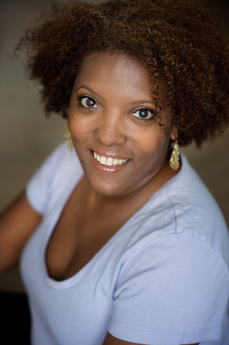 People turn to poetry for any number of reasons, but most look to our art when in the throes of extreme emotion – as comfort in response to a loss, to dramatically coax or celebrate love, or to lend strength during trying situations. Because poetry is mostly my day job, maybe it makes sense that I have inverse longings. I'm often moved more by the poem that can shock me into a new awareness of everyday existence than the poem that's built to commemorate. Jonterri Gadson's poems are earthbound, with a compelling practicality, but Gadson lives in the visceral. Her poems are emotionally intense, but they're always rooted. Gadson uses highly controlled lines and stanzas as counterpoint to the vicious, the sensual, and the furious. The power of feeling she lends the everyday continually amazes: see for yourself. The poem below first appeared in Callaloo. * Mercy When the sow doesn’t refuse them her sequence of teats. When her swollen, spotted body, bristles spearing mud, permits a dozen snouts’ pressure burrowing beneath her-- unapologetic litter of grunts, hungry self-serving soldiers, cacophonous squeals urging over, over. Not to protect her face from their hooves, but that she could crush them, we pen her in. Narrow. Leave only enough room for her to lay down. When she doesn’t, in a quiet rage, slaughter them herself she suffers each unrelenting mouth, she sates our wild expectations. * Jonterri Gadson is the author of the chapbook, Pepper Girl (YesYes Books, 2012). She is the recipient of scholarships/fellowships from Bread Loaf, Cave Canem, and the University of Virginia's Creative Writing MFA program. Her poetry is forthcoming or published in Los Angeles Review, Callaloo, The Collagist, Anti-, PANK and other journals. She currently serves as the Herbert W. Martin Post-Graduate Creative Writing Fellow at the University of Dayton in Ohio.  When I was a girl, I lived in an area that attracted plenty of lightning bugs mid-summer. My siblings and I watched them, chased them, and sometimes, briefly, coaxed them to land on our skin. We never trapped them in mason jars or glasses, but I like the imagery of that. Fireflies pulsing with green bioluminescence, creating gorgeous anarchic lanterns by their pulse. Reading Ben Clark's work, what comes to mind are lovely, living lights that inspire awe and sorrow. Clark understands the dichotomy between distance and closeness very well – and the difference between beauty and brutality. He knows how to let tension in a poem ease just enough before it rains. I like the lights Clark cages. I like how he whispers as he asks his reader to watch the glow. I warm my hands by that. * Ben Clark grew up in rural Nebraska and now lives in Chicago, Illinois. He has worked as an English teacher, librarian, tile maker, track coach, and in a microwaveable popcorn factory. He is an assistant editor for Muzzle Magazine, and recently returned from the very successful Little Bones tour with a new tattoo. His first full-length collection of poetry, Reasons To Leave The Slaughter, was released by Write Bloody Publishing in 2011. You can find more of his work here: benclarkpoetry.com 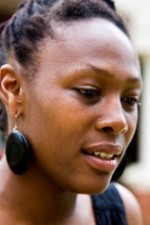 The ego is a powerful and dangerous thing. Consumers of art often want to directly associate a piece of writing with the person who created it, and often they're correct to do so. Much of American poetry has had a strong confessional bent for a couple of centuries now, and plenty of poets have exploited that aspect of the work, sometimes to their detriment. Nandi Comer, on the other hand, makes anonymity an art. She is a close observer, layering details of the scenes she creates with tenderness and care. Reading a poem by Comer makes me feel as though I'm staring at a faded snapshot that gradually invades my mind, until I feel myself to be by her side, watching life unfold. By muting her own presence in her poems, Comer helps her reader to be similarly open to a larger view of humanity. Read this woman. Watch for her. She'll take you places you've never been and make them feel like home. * How Not to Lose the Mask: Mil Mascaras Showers after a Match Masked wrestlers will go pretty far to avoid being ` identified and seen without their mask by fans. -Rey Mysterio, Behind the Mask Through the locker room, past the champion posters, past the black and white TV monitor, in the last shower stall, Mil Mascaras feels the weight of his arms and sinks. The tenderness of biceps, the pull of hamstrings, each sore muscle cooled by a cement bench. While other fighters vacate the locker room, he waits for the shower to warm. He loosens each tight loop laced up his white boot, wonders how many blows his back has taken, how many slaps across his chest. Still ringside, clusters of boys grip tattered autographs and wait for a glimpse of eyebrow, for the faintest ridge of nose. Mil Mascaras slips each leg out of spandex, cuts tape There are better times to leave the embroidered M boxed at home: movie theaters, weddings grocery shopping. One time while a cashier dragged his cans and bottles across a beeping scanner, he studied her bored mouth, how her brow collected in the middle of her head as he faced her. She barely looked in his direction. Water puddles at the drain. He steps under the trickling tap. Lukewarm spray wets his threaded cheek, runs over each stud. His eyelets upturned accept the shower No. She never recognized him, even as he peered into her face, even after he signed his credit card receipt. * Nandi Comer is currently pursuing an MFA in Poetry and an MA in African American and African Diaspora Studies at Indiana University. She has received a Vera Meyer Strube Poetry Prize, Crab Orchard Review’s Richard Peterson Poetry Prize, as well as fellowships from Cave Canem, Virginia Center for the Creative Arts and Callaloo. Her poems have appeared or are forthcoming in Another and Another: An Anthology From the Grind Daily Writing Series (Bull City Press, 2012), Cave Canem Anthology XII (Willow Books 2012), Callaloo, Crab Orchard Review, Sycamore Review, and Third Coast. 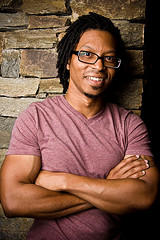 Nathan McClain is probably the poet on the list with whose current work I'm most familiar. He is a great supporter of other poets' work, including mine, and our friendship emerged from our ongoing conversations about poetry. The quality I find most admirable in Nathan's poems is how he manages to create abiding, sustained ache. His speaker never grandstands, and never indulges in self-pity – on the contrary, his discursive interrogatives often implicate him in his own sadness. Nathan accomplishes this using understated language, a quiet voice that knows sorrow well, and accepts it. Few poets have the courage to enter that place and stay there – I think of Larry Levis as one, and Carl Phillips, often – but it's fundamental to good writing: to look and speak clearly, even when it comes to pain. Please enjoy. * Houdini Who would’ve known you’d grow so afraid of stillness, enclosed spaces, that you’d no longer remember a time you weren’t subtracting seconds from your life, as if each breath were held? If you had the strength to pluck your lucky quarter from behind your wife’s ear, would you have? Would she still laugh? A teakettle boils on the stove, its steam enough to unlock your lungs. Your wife reads from Robinson Crusoe, whom you cannot help but dream of, enveloped by endless miles of ocean. Outside, paper skeletons are strung up on every house in your neighborhood. You hear a boy skipping up and down the block, begging his mother, for Halloween, Mom, can I please be a ghost, please? * Nathan McClain holds an MFA in Creative Writing from Warren Wilson College. His poems have recently appeared or are forthcoming in The Collagist, Weave, Quarterly West, The Journal, Nimrod, Toad and Best New Poets 2010. A recipient of scholarships from Vermont Studio Center and The Bread Loaf Writers' Conference, he currently lives and works in New York. 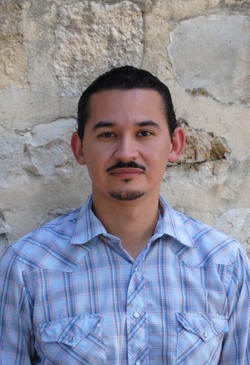 A successful writer knows how to bridge the gap between the individual and the greater world. Among the more common flaws in novice poets' work are obscurity and self-absorption, a lack of connectedness and empathy that prevents their poems from truly resonating with a reader. This kind of writing can be seen in workshops and open mics everywhere: it's a stage of development many of us traverse, and some never transcend. One of the things I love about Tomás Morin's poems is his quality of attention, his concern with larger questions and happenings. Morin has a roving, eager intellect, and his work is sophisticated without being solipsistic. This is evident in Morin's careful rendering of detail: in his eye towards his surroundings, and in the way he patiently guides a reader through a landscape, he demonstrates himself to be a devotee of empathy. It's a pleasure to read work that's so generous, and so thoroughly humane. The poem below previously appeared in Literary Imagination. * Winter after Abel Grimmer There is a church with a steeple and houses whose roofs mirror the slope of the church’s roof which is meant to dominate the center of the canvas; such was the nature of faith in the sixteenth century. If you lose interest in the architecture the snow will always yoke you back in, as will the barren trees that make your eyes dart from one to the other in search of a nest, a bird, a remnant of a bird even, and when you fail to accomplish even this small task you will turn to the ice and the skaters because there is nothing else to turn to and because there is certainty in their movements, and this comforts you, the slicing of smooth spirals and the hand-holding and the red noses— only there are no skaters as you had once thought and now you are confused and all you can see are the people being beaten with clubs and branches from the trees you had worried over, and then you notice the empty lake in the background, the greater body of water in the frame, and you tell yourself the ice will crack, the snow melt, and this is something which makes you feel better because it is a scene you have witnessed before. * Tomás Q. Morín was the winner of the APR/Honickman First Book Prize for his poetry collection, A Larger Country. He is co-editor with Mari L’Esperance of the anthology, Coming Close: 40 Essays on Philip Levine. His poems have appeared in Slate, Threepenny Review, Boulevard, New England Review, and Narrative. He teaches literature and writing at Texas State University. 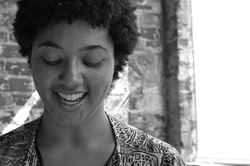 Writers have varying degrees of allegiance with the places they come from, and the places they call home. Someone peripatetic might become obsessed with a number of places, or an expatriate might spend her whole career looking back on the place of her upbringing. For other writers, locale seems to play only a nominal part in their work. Bianca Spriggs is not one of those writers. It's impossible to consider her body of work without also considering the South she calls home. Spriggs talks bourbon and drawl and history - she does it just a little durty, and she does it damn well. I got to know Spriggs when she invited me to participate in the Kentucky Women Writers' Conference in Lexington, but it wasn't until the Affrilachian Poets reading at AWP in 2011 that I got a chance to hear her work at length. She seriously impressed me that night: her work was clear without being simple, bold without being bombastic, with just the right tinge of mystery. And her command of narrative had me swooning. Spriggs' poems have the same subtle touch on the page. She takes great care with line, balancing and breaking brilliantly to round and coax a poem. When I read pieces like the one below, I feel like roads are opening up inside me, inviting me to new parts of myself – parts I'd forgotten – or never realized – were there. I hope she opens you up, too. * Alchemist The woman next door says she don’t have to ask if it was me or him rearranging the furniture last night. Don’t take that much to grow a man the way you want him. She tells me how all a woman had to do to snag her the right man or cure one from being a terror, was to scare up some nightshade. She says it used to be simpler when the world was simpler. Used to be in the South, you could find it just about anywhere on account of how liberal the law was with hanging men. You’d look for the mandrake right where he’d been hung and spasmed the last of his seed into the earth. But she doesn’t say, spasmed his seed. She says something else which means having an orgasm as you die. You had to harvest the plant before dawn on a Friday and you’d sometimes get a four-foot root already bulging into a homunculus. But she doesn’t say, homunculus. She uses a racial slur. Then it’d want feeding. Goat’s milk. Honey. Dried mushroom. Blood from a fresh cut. Eventually that little thing would come to life, start moving around, wail like an infant if it didn’t have its food. When it got adolescent-old you’d slit its throatroot because, after all, it’s just a plant. Dry it out. Grind it down. Serve it in tea to the man you’re wanting to do right and that was that. What do you do now, I want to know, if you don’t have a mandrake? She says, Find someone who do. I know where a whole mess of ‘em grow. * Affrilachian Poet and Cave Canem Fellow, Bianca Spriggs, is a poet and multidisciplinary artist based in Lexington, Kentucky. Bianca is the recipient of a 2013 Al Smith Individual Artist Fellowship in Poetry, multiple grants from the Kentucky Foundation for Women, and a Pushcart Prize Nominee. In partnership with the Kentucky Domestic Violence Association, she is the creator of The SwallowTale Project: creative writing for incarcerated women. Bianca is the author of Kaffir Lily (Wind Publications, 2010), How Swallowtails Become Dragons (Accents Publishing, 2011), and her work may be found in several anthologies including New Growth: Recent Kentucky Writings, and America! What's My Name?, as well as numerous journals including Reverie, Union Station Magazine, Appalachian Heritage, Caduceus, Alehouse, Tidal Basin Review, The Journal for Feminist Studies in Religion, The Louisville Review, Still, and Muzzle. She is currently the Managing Editor for pluck! The Journal of Affrilachian Art & Culture. You can learn more about her current and upcoming projects here: www.biancaspriggs.com. |
Archives
June 2024
Categories |

 RSS Feed
RSS Feed